21 August Attack: Babar-nama
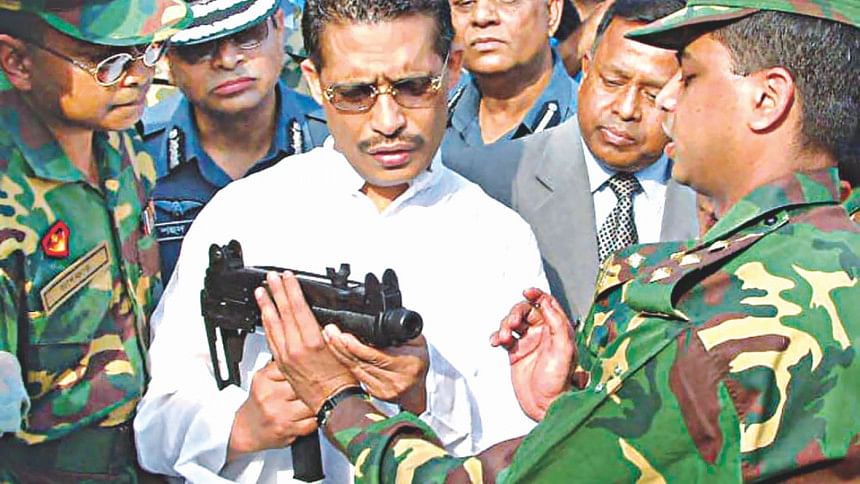
It was the cabinet's oath-taking night after the 2001 parliamentary elections. The phone rang in the newsroom of The Daily Star. On the other end of the phone was the quivering voice of a man who, in his Dhaka University student days, was an infamous "armed cadre" of a political party.
"Is it true that Babar has taken over the home ministry?" the voice asked.
"Yes, why?"
"I have to leave the country then," the once mighty man said and then related his own experience.
He recalled that one day in the late 1980s he was loitering around TSC in the university when a young boy came to him and broke down in tears. Somebody had taken Tk 2 lakh from him, his mother's last savings, in the name of sending him abroad. However, this man had neither sent him abroad nor returned his money.
The man took the boy on the back of his motorbike and together they went to the Motijheel office of the swindler. The "armed man" climbed to the first floor, opened the door and saw a man sitting on the other end of a big table.
The armed man silently placed his pistol on the table and asked the swindler to pay up the money he owed to the boy, or else …
The man on the other end of the table immediately recognised the Dhaka University "terror" before him and started trembling. In ten minutes, the whole amount was returned to the boy.
About two decades down the line, the man who had tried to swindle the boy had become the BNP-led government's state minister for home.
He was not just a simple "state minister" -- a lesser minister who just ornamentally decorates the post with little decision-making power. Babar was definitely not one of them. He was a super minister with more power than the home minister Altaf Hossain.
A 'HAWA BHABAN MAN'
Speaking to various sources and going through different newspaper articles and case documents, a dark portrait of the man can be formed.
It is said that this non-descript man with a shady background steeped in dubious schemes and hardly any place in the BNP was picked by Tarique himself for some special purpose.
A source close to Tarique during the 2001-2007 BNP rule recalls the oath-taking night when Tarique introduced Babar to him, saying, "Meet Lutfozzaman Babar. He is my home minister."
Sources said Babar was initially unhappy to be state minister but he was assured by Tarique that he would be the main man to run the Home with his advice.
Much later, the purpose of picking him became clear. Babar certainly had some "qualities" to secure the most trusted place in Tarique's clique and those would later become obvious.
The US embassy in Dhaka, in a secret cable on May 11, 2005, drew an interesting picture on the workings of the BNP's inner circle and Babar.
"Loyalty, proximity, and length of service to PM Zia still count for far more than [a] title of institutional position, but for Zia loyalty is a two-way street," the cable read. "Many insiders have a close relationship with her son and heir apparent, Tariq Rahman."
About Babar it said: "A known smuggler, an ally of Tariq, and reportedly pro-JI/pro-Islamist. His influence will grow as his ministry becomes more active in the run-up to the next general election."
HUMBLE BEGINNING, STRONG CONNECTIONS
Hailing from a remote corner of Netrokona, Babar's father was a senior police officer who was part of President Ziaur Rahman's security team and, as such, personally knew Zia and his wife Khaleda Zia.
All of Babar's siblings were bright students, but Babar himself did not continue beyond high school, said those who knew the man closely, contradicting his bio in the parliament which said he was a college graduate.
Babar grew up in Moghbazar area, his family residence being close to the Red Crescent Hospital. A man with no interest in education, he turned to making money, which he did through the dark alleys of illegal trade.
The 1980s was a high-tax era with hardly any opportunities for business except for government contracts. Babar found this tax regimen a good opportunity to exploit -- he turned to smuggling digital watches, mostly of Casio brand, into Bangladesh. He reportedly built a good rapport with Raushan Ershad, the wife of the-then president General HM Ershad, whom he called "mother". He used the connection to carry out his smuggling business through the Dhaka airport. With watches, other items, like gold, were also added to his smuggling list. In time, money followed and made him a rich and powerful man, well-known in his Netrokona area.
Then came a break in his smuggling career which accidentally catapulted Babar into politics.
As the 1991 election approached, BNP could not find any good candidate in Netrokona –4 constituency.
One day, the founder secretary general of BNP, Col Mustafizur Rahman brought a 27-year-old man to Khaleda Zia's residence and introduced him to her as Babar. Babar was initially hesitant to plunge into politics but a couple of days later, he met Khaleda again and said he was ready to run in the election.
He was reminded that his opponent was Awami League's Abdul Momen, a heavy weight, and the contest would be a tough one. Babar happily took the challenge and went on to win the seat.
THE SMOOTH OPERATOR
He was reelected in the next February, 15, 1996 election which was boycotted by the AL-led opposition in demand for introduction of a caretaker government system. He was re-elected once again in 2001.
Until then, his highest achievement in politics was meagre. A small fry, Babar was the president of Amra Ziar Uttorshuri (We Are the Successors of Zia) of Dhaka as mentioned in his parliamentary bio.
But after the BNP lost the 1996 general election, Khaleda Zia brought major changes to BNP central and Dhaka city committees. Salam Talukder was removed from the party secretary general post and Abdul Mannan Bhuiyan was given the post. Former Dhaka City Coporation Mayor Sadeque Hossain Khoka was made Dhaka city BNP President.
Salam Talukder introduced Babar to Khoka as a very dynamic young man and advised Khoka to engage Babar in party activities.
But then after the 2001 elections, everybody was surprised to see this little known man become the state minister for home.
In the beginning of his career, Babar proved himself to be an efficient manager, effective in implementing the government's wishes. He was a smooth talker and could convince people quickly.
He was also instrumental in forming the Rapid Action Battalion (Rab) in March 2004, an action that won him praise from the US embassy as well which, in cable on 2005, wrote: "His [Babar's] dynamic management has turned a major political liability for the BNP -- law and order -- into a modest asset, in part by creating and launching the Rapid Action Battalion, arguably Zia's most popular initiative this term…"
However, within a week's difference from the formation of Rab, ten trucks of arms -- from rocket launchers to Uzi machine guns to grenades -- were seized at Chittagong. A proud Babar was beamed across televisions, showing him running his hand over the machine guns, claiming it was a major arms haul.
A CULTIVATOR OF CRIMINALS
Much later, when the BNP rule ended, fresh investigation revealed that Babar himself was involved in the smuggling of the arms which were being shipped to Assam for the Ulfa separatists. The arms were being smuggled in a very clandestine operation but the whole thing fell through accidentally when the trucks were stopped by a curious traffic sergeant, who had no idea about the consequences of the whole thing.
BNP's policy of helping the Ulfa with arms and training bitterly soured the party's relationship with India. The case also shed light on how Babar had involved the entire government machinery, including the two top men of the National Security Intelligence (NSI) and DGFI in the smuggling racket.
During the trial of the case, then DGFI chief Major General Sadeq Hassan Rumi told the court in 2012 that Babar had influenced the investigation. Babar got the death penalty in the case as the main accused.
Within five months of the arms haul, the gruesome August 21 grenade attack happened and Babar once again misled the investigation when he invented the story of a pickpocket named Joj Mia who, he claimed, was solely to blame for the attack.
Again, once the regime changed the truth came out and Luftozzaman Babar got death penalty for his planning and execution of the attack using Huji militants.
The word militant has a special meaning while discussing Babar. He had a long association with people of extreme views which he later cultivated into terror activities when he was in power.
He gave all the police and administrative support in organising a vigilante militant group called JMJB led by one extremist named Bangla Bhai in the northern districts. When the media, especially The Daily Star and Prothom Alo, extensively exposed the open lynching of people by this group, Babar told the BBC in an interview on January 26, 2005, "We don't know officially about the existence of the JMJB. Only some so-called newspapers are publishing news on it."
Because of his open support for the Bangla Bhai group, local police would ignore instructions of the inspector general of police (IGP). Then IGP Nur Mohammad, in an interview with The Daily Star, in June 2007 said: "Lutfozzaman Babar never helped to fight the militant group."
It did not take much time for matters to go out of hand as the militants, emboldened by Babar's backing, started detonating bombs across the country in a show of strength. In one instance, on August 5, 2005, about a year after the August 21 grenade attack, the militants detonated 450 bombs almost simultaneously across the country in courts and important public places. The reign of terror went so far as to killing judges.
In one such incident, a Hindu boy was killed and Babar, without even blinking once, termed the boy a 'Hindu militant'.
FROM MINISTY TO GALLOWS
As matters started going out of hand and international pressure mounted, the man whose very existence Babar denied -- Bangla Bhai -- was arrested.
Another top militant, Mufti Hannan, who played a key role in the August 21 grenade attack, was also arrested in October, 2005 following the bomb blasts.
Hannan, who all this time had a free hand in carrying out his militant activities and was responsible for the killing of over a hundred people in 13 militant attacks between 1999 and 2005, told the media when he was being taken to the court that he was given the assurance that he would not be arrested. Hannan was later hanged last year for the grenade attack on the British High Commissioner in Sylhet in 2004.
As the BNP regime was ending, Babar became even more reckless and started taking bribes in exchange for abdicating murderers, the worst being in the murder case of businessman in a hotel in 2006 by the son of a business tycoon.
According to case documents, Babar took Tk 21 crore to keep the murder secret and beyond anyone's notice.
He kept his promise and he hid the murder from the public eye only to be exposed after the regime change. A case was filed and the trial continues until now.
Afterwards, yet another vicious face of Babar was unveiled when joint forces recovered a shotgun, a rifle, a pistol and a Brazilian revolver, along with two magazines and 297 rounds of bullets from his residence. He was later sentenced to 17 years in jail for keeping illegal arms.
Babar's story is endless as another ten cases are pending against him. The man, who came out of nowhere in Netrokona, rode at the crown of a strange time when crimes of the crudest nature were possible with the abuse of state power. A man who once was supposed to curb crimes today awaits the gallows as a criminal.

 For all latest news, follow The Daily Star's Google News channel.
For all latest news, follow The Daily Star's Google News channel. 

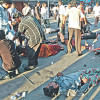
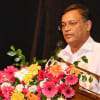
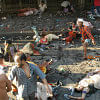
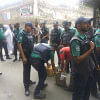
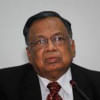


Comments